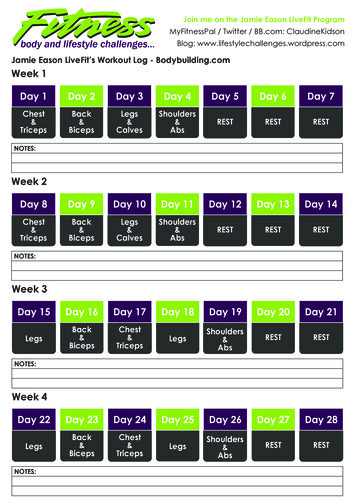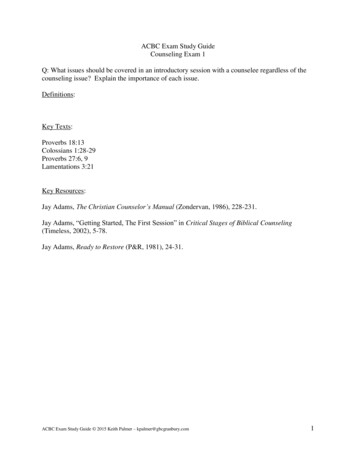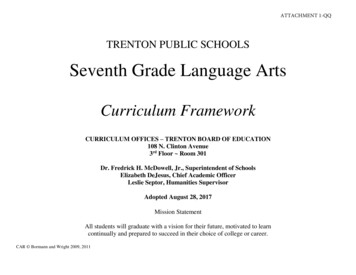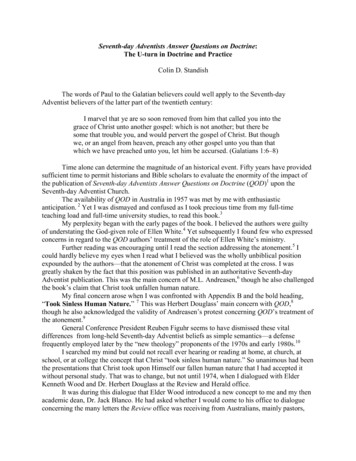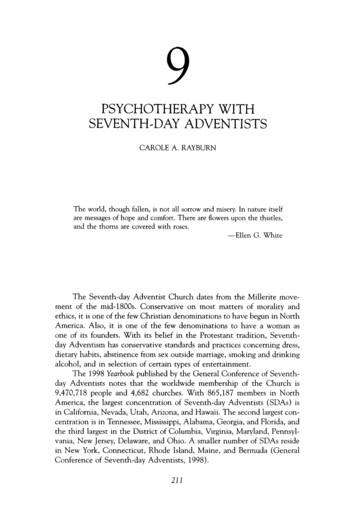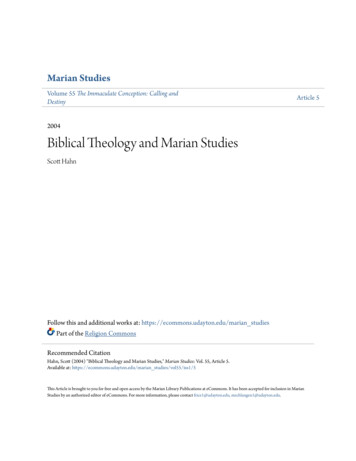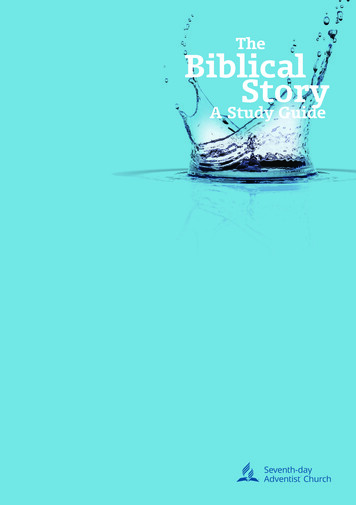
Transcription
TheBiblicalStoryA Study Guide
INTRODUCTIONZlatko MusijaYouth Director, Trans-EuropeanDivisionWhen I look back at my journey of faith, I can identifyseveral decisive ways in which God worked to bringme closer to Him. Firstly, I grew up in a churchenvironment where young people were fully embracedand involved in the life and mission of the Church.Secondly, as a group of young boys, we had wonderfulfriendships within the church. Thirdly, the Bible playeda significant role in my family, and in my local church.I still remember receiving a new copy of the Bible as agift. Our group of 7-10 year-old boys became fascinatedwith it. Somehow, the Bible became our preoccupation;our main game. We would spend hours and hoursreading it, and then testing each other’s knowledge.I fell in love with the Bible and its interesting details.Later, I found something more in the Bible - a veryattractive portrait of God as a loving and caringFather. I realised that the Bible is not so much aboutsmall human stories, but about one big story of Godand His mission to bring us back to Him. I fell in lovewith the great Hero of the Bible and that completelytransformed my journey of faith.This Bible study guide has been developed to help youfall in love with the Bible and to read it as one big storyof God’s love. We will not primarily be exploring themain teachings of the Seventh-day Adventist Church,although we will cover those things. We’ll look at howthe Bible’s big story, and some of the smaller storiesare relevant in our lives today, and then try to find ourplace in this great story.Our study will not simply be about reading a few verseshere and there, but we will be looking at entire Biblicalbooks. It is not enough to know ”what we believe.” Infact, that is irrelevant if it does not link us to ”who webelieve in.” It is all about a personal, living relationshipwith Jesus. Perhaps there are many who do not find theChurch meaningful because our focus on doctrine andlifestyle issues has overshadowed ‘who’ it is all about.It must be more about explaining who God is and lessabout who we are.Many young people do not know how to read theirBible. Perhaps you are one of them. You need toolsthat you can use for the rest of your life. Our desire isto help you understand the great Biblical story, so thatyou can better understand your own story and fall inlove with a loving God.
Primary Contributor & Editor: Thomas John RasmussenIntroduction: Zlatko MusijaEnglish Proof: Beverly CoystenGraphics: Little Zebra StudioFirst published in Danish under the title: ”Den bibelskefortælling.” (The Biblical Story)Original feedback: Iben Bidstrup, Lars Dorland, Lisa Rytman,Allan Falk, Christina Falk Holm, Sven Hagen Jensen, AndreasMüller, Thomas Müller, Flemming Pedersen, GunnarPedersen, Morten Rechter, Robert Sand, Joachim ThortzenOriginal Graphics: Adventistkirkens MediecenterThis study series was first developed in the Youth MinistriesDepartment in Denmark (2010-2013)This document and all its parts are protected by copyright.Any exploitation beyond the narrow limits of the copyrightlaw without the consent of the copyright holder is forbiddenand punishable by law. This applies in particular toreproduction, translation, microfilming and to processing inelectronic systems.1st English Edition 2020All rights reserved Trans-European Division of the Seventh-day Adventist Church, Youth Ministries Department, 119 St Peter’s Street,St Albans / Herts, AL1 3EY, United Kingdom
TABLE OFCONTENTSPage3Introduction7Study Plan – Methodology9Study Plan – Who Is Jesus?10Study Plan – The Biblical Story12Presentation – The Seventh-day Adventist Church14Overview – A Bible Study Guide18Lesson 1 – Paradise – God’s Original Plan and the World Today22Lesson 2 – Faith25Lesson 3 – God’s People and God’s Law28Lesson 4 – The Kingdom of Israel – A Man After God’s Own Heart31Lesson 5 – Prophecy and the Coming Messiah37Lesson 6 – Discipleship – Part 140Lesson 7 – Discipleship – Part 244Lesson 8 – Discipleship – Part 348Lesson 9 – The Church and the Holy Spirit51Lesson 10 – The Church and the Individual54Lesson 11 – The Sanctuary57Lesson 12 – The Second Coming of Christ62Lesson 13 – The Righteousness of God65Lesson 14 – Paradise Restored70The Seventh-day Adventist Movement72Lesson 15 – Ellen White76Lesson 16 – Healthy Living80Lesson 17 – Family84Additional Resources85Seventh-day Adventist Beliefs97Baptismal Vows
STUDYPLAN
METHODOLOGYReading the Bible as a grand story is not a newconcept within the Seventh-day Adventist Church, noroutside of it for that matter. In particular, the idea ofan overarching theme is very present in the bookswritten by Ellen White. The “Conflict of the Ages”series, beginning with “Patriarchs and Prophets”and concluding with “The Great Controversy,” arefrequently referenced. However, our fundamentalbeliefs came into existence primarily as a reaction.We have done our best to ensure that our beliefs arecentred around the character of God, yet sometimes werisk focusing on the details in our presentations. Weforget about the big picture.Imagine, for a moment, that our beliefs are like fenceposts that surround a field. They mark the bordersof the field, just like our fundamental beliefs markthe framework of our understanding of the Bible.“Patriarchs and Prophets” begins with three words,“God is love” and “The Great Controversy” concludeswith the same three words, “God is love.”The Bible begins with the words, ‘In the beginningwhen God created the heavens and the earth.’ (Genesis1:1). It concludes with the words of John, ‘The one whotestifies to these things says, ‘Surely I am coming soon.’Amen. Come, Lord Jesus! The grace of the Lord Jesusbe with all the saints. Amen.’ (Revelation 22:21-22)God created the world with a meaningful beginning.It is going to have a meaningful end, and in themeantime, He will be with us. God is our creator. Godis love. We hope you will reach this conclusion duringthese studies of the Bible – the greatest revelation andthe primary authority for us today.7
These studies have been set up in a way thatencourages you to read larger portions of Scripturebefore participating in your study group or meetingwith your pastor. We’ve created spaces where you canwrite down your questions during these readings, butwe will also supply questions in advance that can helpyou understand what you are reading.Keep a pencil or a pen close to you when you arereading. Underline the important things. Highlightthe things you don’t understand, so you can raise aquestion about it.There’s no set timeframe for how long this seriesshould take. Though we’ve created 17 lessons, someof them may require more time than just one evening.It also depends on your age, your familiarity withChristianity, the Bible and your cultural background.Adapt, as you see fit.This material is not “only” meant for baptismpreparation, though we trust it will be useful in suchsettings.Prayer, Bible study and Service are some of the subjectsthat will help you in your lifelong relationship withGod. Hopefully, this series will equip you so you willcontinue studying even after you’ve finished theselessons.This series includes video presentations, which can beuseful for both teacher and student. This book is meantto be a catalyst for the Bible study, with questions,reflections and appeals that may help you in yoursearch for meaning and purpose in life; in your searchto get to know Jesus.8
WHO IS JESUS?It is when we ask this question that we find purpose inour lives. Who is Jesus? What did He do? What is He doing now? What is He going to do in the future? How does it impact the world? How does it impact me?This series is based on the model of “The Biblical Story”as presented by Gunnar Pedersen (ThD, AndrewsUniversity), retired pastor of the Seventh-day AdventistChurch in Denmark and former head of Departmentof Theology at Newbold College in England. (See nextpage)The goal of this series is three-fold:1. Discipleship – what does it mean to follow Jesus?2. The Bible – what does it teach? How do I read it?3. Seventh-day Adventists – what should I knowbefore I join this movement?Most of the studies are based on the various stages ofthe Biblical story. You will also find three subject-basedlessons that can be studied in any order you see fit,or perhaps as the conclusion of the series. On pages70-71 you can read more about the selection of thesesubjects.9
THE BIBLICALSTORYThe illustration shows a timeline of the Biblical Story.It is divided into seven stages that help you see the bigpicture of God’s plan of redemption – for the world,and for you!Theologically, the seven stages of the Biblical Storymake up the core of Seventh-day Adventist Biblicalbeliefs. It includes the following:1. First, God’s sovereignty as creator and sustainer ofHis good creation, which He finished on the SeventhDay, the Sabbath. A reality that all creatures aredependent on (Paradise Created).2. Second, the fall of humankind from a perfectcommunion with God to an evil condition of heartand mind. The result of this is an evil world orderthat keeps creation under a divine curse.3. Third, the divine and prophetic promise and theobligation of the covenant to save humankind andrestore creation; a plan God has promised to followthrough, which is what the whole Bible is about.4. Fourth, the personal identity of Christ as the savingrepresentative in the lost world. He is the oneperson to live through the Divine judgment overhuman sin, break the curse and execute God’s plan(Paradise Won).5. Fifth, the priestly function of Christ, being “the righthand of God” after His ascension. Now, His task isto lead people to repentance, give them forgivenessand send the Holy Spirit in His place to restore thebroken relationship between humanity and God.10
6. Sixth, the conviction that the concluding chapter ofthe Biblical Story, “The Lord’s Day”, has come; an erain which Christ will execute His royal authority. Asjudge He will justify the believers, reveal His kingdom at His glorious advent, and destroy the regimeof evil. Thereby, He will glorify those who are saved.7. Seventh, the conviction that this concluding chapterand the goal of the story of redemption will reachits climax in the creation of the new heavens andthe new earth. The curse has been lifted, death is nomore, and God will live with His people (ParadiseRestored).“We have nothing to fear for the future, except aswe shall forget the way the Lord has led us, and Histeaching in our past history.” Ellen White, Life Sketches,p. 196THE BIBLICAL STORYStage1CREATIONStage2FALLStage3ABRAHAM - ISRAEL - DAVID - PROPHETSStage4CHRIST’S NEW CREATIONTHEPROMISEGEN 3:1511
PRESENTATION OF THESeventh-dayAdventistChurchTRIVIA ABOUT USSeventh-day Adventists are a world-wide family of Christianbelievers. Like other Protestant churches we base our beliefson the Bible. Thus, we believe Jesus Christ is God and thatHe died for our sins. In Europe we number almost 350,000members. We meet every week to worship God and enjoyour fellowship. Globally, we have approximately 22 millionmembers, but even more people come to our churches whichare open to everyone, including you.Even though there are not that many Adventists in Europecompared to the size of the population, it’s not implausiblethat you may have met one of us, or seen one of our churchbuildings. Our impact on society has been made in varyingways. For instance, we run many private schools where manystudents, are not from an Adventist background.Were you aware that Desmond Doss the WW2 conscientiousobjector who saved 75 lives at Hacksaw Ridge was anAdventist? John Harvey Kellogg, American physician andhealth-food pioneer, was also an Adventist for most of hislife. We try to make an impact by caring for the basic needsof people world-wide (ADRA), by improving their holisticwell-being (health ministry) and by supporting religiousfreedom around the world.Of course, if you want to know more about us, the best wayis to visit us. Everyone is welcome.WHO ARE WE?What does it mean to be a “Seventh-day Adventist”? Well,the name consists of two elements.The Seventh day is a reference to the Sabbath. When Godcreated the world, He made the seventh day holy. That’s whywe attend church on that day and worship God as a way ofreminding ourselves that He is our creator.
“Advent” you probably recognise from the Sundays leadingup to Christmas Eve. It means “coming”, and duringChristmas we look forward to the coming of the baby Jesus.However, when we speak of the “advent” in our churches,it is about His Second Coming rather than His first. Oneday, Jesus will return to establish His kingdom, and we lookforward to this.In effect, “Seventh-day Adventist” refers to the beginningand the end, Creation and Restoration. Jesus says abouthimself that He is the beginning and the end (Revelation22:13). Seventh-day Adventism is about Jesus more thananything else – He created the world, and He will restore it.THE SEVENTH-DAY ADVENTIST CHURCH LOGOThe logo reflects some of our core values. The Bible isthe foundation. In the logo you will notice an open book,because its message is meant to be read and practiced.Central to this message is the cross, which is at the centreof the logo. Above the cross and the open Bible, you will seethe burning flame of the Holy Spirit. Without the power ofthe Spirit we can neither understand the Bible or the cross.The lines in the top of the designindicate an upward movement. Itsymbolises our resurrection andascension to heaven at the SecondComing of Christ, the ultimatefocus of our faith.The Open BibleThe Bible forms thebase of the design andrepresents the Bible as thefoundation of our beliefs. Itis portrayed in a fully openposition suggesting a fullacceptance of God’s word.The CrossThe symbol of the cross representsthe gospel of salvation. It is placedin the middle to emphasise thesacrifice of Christ as the centraltheme of our faith.The FlameThis is the shape formedby three lines encirclingan implied sphere. Thelines represent the threeangels of Revelation 14circling the globe and ourcommission to take thegospel to the entire world.The overall shape forms aflame which signifies theHoly Spirit.13
OVERVIEW A BIBLE STUDY GUIDEThe lessons are ordered both by topic, title and withinwhich part of the Biblical account they belong.Lesson 1 – Creation, the Fall, the Promise (stages 1 2)Bible Passages: Genesis 1-3Topic: Paradise – God’s Original Plan and theWorld TodayLesson 2 – Abraham (stage 3 – part 1)Bible Passages: Genesis 12-25, Romans 4, Hebrews 11Topic: FaithLesson 3 – Israel (stage 3 – part 2)Bible Passages: Exodus 1-3, 11-12, 14-20, 24:1—25:9,31-34, Deuteronomy 30, 34, Joshua 1Topic: God’s People and God’s LawLesson 4 – David (stage 3 – part 3)Bible Passages: Ruth 1-4, 1 Samuel 8, 2 Samuel 1-24,1 Kings 1-2, 11Topic: The Kingdom of Israel – A Man AfterGod’s Own HeartLesson 5 – The Prophets (stage 3 – part 4)Bible Passages: Micah 5, Psalm 55, Zachariah 11,Psalm 22, Isaiah 53Additional Bible Passages: J eremiah 31:27-40, Daniel1-12, Isaiah 1, 42, 43, 52:13—53:12, 65-66, Malachi 1-3Topic: Prophecy and the Coming Messiah14
Lesson 6 – Christ’s Ministry (stage 4 – part 1)Bible Passages: Matthew 5-7 (Sermon on the Mount)Topic: Discipleship- Following Jesus- Loving Your Neighbour- PrayerLesson 7 – Christ’s Ministry (stage 4 – part 2)Bible Passages: John 1-11Topic: Discipleship– The Life of Jesus– The ResurrectionLesson 8 – Christ’s Ministry (stage 4 – part 3)Bible Passages: John 12-21, Acts 1-2Topic: Discipleship– Baptism– The Cross– Communion– MissionLesson 9 – The Church (stage 5 – part 1)Bible Passages: Matthew 28:18-20, Acts, Romans 10Topic: The Church and the Holy SpiritLesson 10 – The Church (stage 5 – part 2)Bible Passages: 1 Corinthians 1-2, 13-16,Ephesians, JacobTopic: The Church and the Individual15
Lesson 11 – The Judgment (stage 6 – part 1)Bible Passages: Leviticus 16, 1 Kings 8, Matthew27:45-56, HebrewsTopic: The SanctuaryLesson 12 – The Judgment (stage 6 – part 2)Bible Passages: Matthew 25:31-46, Romans,1 Thessalonians, 2 ThessaloniansTopic: The Second Coming of ChristLesson 13 – The Judgment (stage 6 – part 3)Bible Passages: Ezekiel 28:11-19, Romans 3,Revelation 12Topic: The Righteousness of GodLessons 11-13 can also be done as one study dependingon the age of the students.Lesson 14 – New Creation (stage 7)Bible Passages: RevelationTopic: Paradise RestoredThe Seventh-day Adventist Movement(Lessons 15-17)Lesson 15 – Ellen WhiteBible Passages: G enesis 5-6, 11-24, Exodus 12:40-42;Jeremiah 29, Daniel 8-9, Amos 3:7,Mark 1, Revelation 1016
Lesson 16 – Healthy Living (Lifestyle – part 1)Bible Passages: Numbers 6:1-21, Matthew 22, 34-40,Romans 14, 1 Peter 2:9-10Topic: – What we abstain from– What we discourage– What we recommendLesson 17 – Family (Lifestyle – part 2)Bible Passages: G enesis 1-3, Ephesians 5:21-33,1 Corinthians 6:12-20Topic: – Marriage– Sex– Cohabitation– Choosing a spouseSuggestions for additional studies:Lesson 18 – ForgivenessLesson 19 – Devotional LifeLesson 20 – PrayerLesson 21 – Witnessing17
1PARADISE– God’sOriginalPlan andthe WorldToday
CreationSinSTAGES 1 2THE PROMISEBIBLE PASSAGES:Genesis 1-3QUESTIONS How did it all begin? Why was the tree of the knowledge of good andevil placed in the Garden of Eden? What happened at the fall? What does God promise will be the solution forall sin? How does Genesis 1-3 fit with life as we know ittoday?19
THOUGHTS“In the beginning God created the heavens andthe earth.” What does that mean? Who is dependent on whom? Can the creation exist without the creator?THE CREATORCREATIONIn the creation account (chapter 1-2) God initiates three things.What are they?1.2.3.A0CHAOSA1Light14Sun, moonand starsSkyand sea25Birds and fishEarth andvegetation36Animalsand people7SABBATH20When we tell stories today,there is often somethingimportant in the middle ofthe story. When we watcha movie, the climax oftencomes towards the end,but there is a soft landing,where “the good guys” havewon and “the bad” have lost.When the Hebrews toldstories, the climax comesat the end, and often thereare repetitions (see theillustration). Notice the lastfew verses at the beginningof chapter 2. What is theclimax? What is the mainpoint?
ADAMwwEVEGODwwRelationship between Godand humankind at the endof chapter 2.wRelationship between Godand humankind at the endof chapter 3.wwUSwEVEGODADAMUSNotesCONCLUSIONDepending on who you believe God is, it will be a curse or a blessing that God isyour creator. If God is good, it is amazing that He is our creator!APPEALWhat do you believe about God? Will you believe in Him as your Creator?21
Faith2
ABRAHAMBIBLE PASSAGES:Genesis 12-25Romans 4Hebrews 11STAGE 3 – PART 1QUESTIONS What is faith? How does Abraham’s faith develop during his life? How does the “covenant”, that is, the agreementbetween God and Abraham, change Abraham?What difference does it make? What difference does baptism make? What’s the function of tithe in your relationshipwith God? What conclusions should we draw from the factthat Abraham returned tithe? Why is it important that he returns tithe before heenters a covenant with God?23
Abraham’s Life“Tell them you’remy sister”Covenantwith GodTake your son12 13 14 15 16 17 18 19 20 21 22 23 24 25You can read the story of Abraham in Genesis 12-25.THOUGHTS Abraham journeys in faith – but his doubtsremain He believes in God’s promises and is countedas righteous He makes a covenant with God, but still hestumbles He shows that despite his failures he wants tofollow God.READ2 Timothy 4:6-8CONCLUSIONPaul has assurance of salvation because he knowsthe story of Abraham and knows that God has notchanged. God remains the same today. Therefore,you can also be assured of your salvation.APPEALDo you believe that God wants to save you? Whatdifference does it make in your life?Notes24
3GOD’SpeopleandGOD’Slaw
ISRAELBIBLE PASSAGES:Exodus 1-3, 11-12, 14-20,24:1-15, 31-34Deuteronomy 30, 34Joshua 126STAGE 3 – PART 2QUESTIONS Why is the story of the Exodus so important? What is the significance of Passover for the Jews? Why does God reveal Himself to Israel on MountSinai in this way? What do the Ten Commandments signify? What does it mean to fear God? (Look atProverbs 8:13) How is the story relevant to us even though we’renot a part of the covenant God made with Israel?
THOUGHTSREADDeuteronomy 30 God liberates Israel from Egypt – then He givesthem the law God wishes to bless Israel God wishes to bless others through Israel What are Israel’s two options? What would you choose?CONCLUSIONGod wants the Israelites to live long and prosper – andthe way they do this is by being together with HimAPPEALNotes’S WAYMYGODWAYWhich way will you choose? God’s way or your own?Do you wish to live your life with God?27
4TheKingdomof Israel– The ManAfter God’sOwn Heart
DAVIDBIBLE PASSAGES:Ruth 1-41 Samuel 82 Samuel 1-241 Kings 1:1—2:11STAGE 3 – PART 3QUESTIONS What happens when you reject God’s way? How are we to interpret the behaviour of Israel? What characteristics make David a man afterGod’s own heart? How is King David different from King Saul?29
PSALM 51DAVID’S PRAYER1 Repentance2 Forgivenessfrom God3 Prayer forrestorationBACKGROUND What happens in Joshua 24? How does the Book of Judges conclude?Which way did they choose? Who are they rejecting in 1 Samuel 8?REFLECTION What happens in 2 Samuel 11-12?4 I will help others 5 Prayer forrestorationof othersHow does David react afterwards? ReadPsalm 51. Why is Jesus called the Son of David? ReadMatthew 21.CONCLUSIONJesus is called the Son of David. You are also a sonor a daughter of Christ.APPEALWould you like to be a man or woman after God’sown heart?Notes30
MESSIAHPROPHECYand theComing5
THE PROPHETSSTAGE 3 – PART 4BIBLE PASSAGES:Basic:Micah 5, Psalm 55,Zachariah 11, Psalm 22,Isaiah 53Extended:Jeremiah 31:27-40,Daniel 1-12, Isaiah 1,42, 43, 52:13—53:12,65-66, Malachi 1-332QUESTIONS How did the Jews misunderstand the prophecies of Jesus, and how do we avoid doinglikewise? How can we see that the prophecies point toJesus? What difference does it make, living after thetime of Jesus and knowing that there will bea Second Coming?
THE BIBLICAL STORYStage1CREATIONStage2FALLStage3ABRAHAM - ISRAEL - DAVID - PROPHETSTHEPROMISEGEN 3:15Stage1Stage2Stage4CHRIST’S NEW CREATIONBiblical UnderstandingStage3Stage4KINGCREATIONFALLABRAHAM - ISRAEL - DAVID - PROPHETSNEW CREATIONTHEPROMISEGEN 3:15Jewish Understanding33
THOUGHTSThe prophets predict: The Messiah will die He will be betrayed The Messiah will save us We will be healed by His woundsThey also predict: Paradise will be restored There will be a new heaven and a new earth There will be joy everlasting Evil will disappear foreverCONCLUSIONThe promises point to the Messiah. All of historypoints towards Jesus Christ. God is in control ofhistory – the beginning and the end.APPEALDo you have the courage to believe that Godis in control?Notes34
EXTENDEDBACKGROUNDAfter King David things go well under King Solomon’srule, but after some time he returns to the worship offalse gods.Following the death of King Solomon Israel is split intotwo kingdoms:1. Israel (the Northern kingdom)2. Judah (the Southern kingdom)Then, after repeated rebellion and openly rejecting God,Israel is scattered among other nations.Ultimately, after a final warning by the prophetJeremiah, the people of Judah are taken captive andbrought to Babylon.The rebellion leads to exile – the temple is destroyed –the people are separated from God.STUDYRead Isaiah 1:1-17What is the situation among the Jews before the exile?Why is God angry with them? How are they treatingeach other?Read Daniel 2Which kingdoms is this concerning? What do you thinkthe Jews made of this vision? What did the great rocksymbolise from their point of view?35
EXTENDEDCOMPARERead both chapter 2 and chapter 7 in the Bookof DanielWhat part of the first vision is explained in greaterdetail in chapter 7?What part of the legs of iron is still present today?What is significant about the little horn?REFLECTIONThink of who the solution is in chapter 7.Think of how the Jews are likely to have interpretedit in the time of Jesus.What difference does it make to our understandingthat we are living after the first coming of Jesus?
6DISCIPLESHIP
THE MINISTRY OFCHRISTBIBLE PASSAGES:Matthew 5-738STAGE 4 – PART 1QUESTIONS What does it mean to pray? How do you do it? What does it mean to love your neighbour? What does it mean to follow Jesus?
THOUGHTS Prayer changes you. God knows what you need. Prayer affects God. He is listening and is activeon our behalf. To love your neighbour means to take responsibility for others, not just your own life. To be a disciple means to follow.Write a prayer to God:CONCLUSIONJesus calls us to a life with Him. The message is notjust “good advice”, it’s a message about what He’s donefor us and what He wants to do.APPEALDo you accept Jesus Christ as your personal Saviourand do you wish to follow Him as Lord of your life?39
7DISCIPLE
THE MINISTRY OFCHRISTBIBLE PASSAGES:John 1-11STAGE 4 – PART 2QUESTIONS What does Jesus spend time on? Who does Hespend time with? How does Jesus reveal Himself as Creator andSaviour? What does Jesus say about Himself?SHIP41
THOUGHTS Jesus spends His time on the marginalised ofsociety Jesus is in conflict with the Jewish leaders Jesus helps, heals and teachesFind the instances in the Gospel of John whereJesus says “I am”:ABChapter 1:1-5Chapter 1:6-8.15a In the beginning (existed before)a Sets the historical timeframeb With God (relationship to God)b John is not the lightc Was Godc John is a witness to verses 1-5d Creatord He is mentioned as a witnessto what followse Sustainerf Life and lightg Defeats darknessJOHN 1:1-1842WHO
CONCLUSIONJesus is everything for us. He is the Creator and theSaviour of the world.APPEALWho is Jesus to you? How can you get to know Himbetter?NotesCChapter 1:9-13a He was in the worldDChapter 1:14.16-18a The Word became flesh (God became man)b The world came into being through Him b Seen His gloryc He came to His ownc Received graced His own did not welcome Himd Law from Mosese FAITH right to be calledchildren of Gode Grace and truth from Jesus ChristIS JESUS?f Nobody has seen Godg The Son has revealed the Father43
8DISCIPLESHIP
THE MINISTRY OFCHRISTBIBLE PASSAGES:John 12-21Acts 1-2STAGE 4 – PART 3QUESTIONS Why was Jesus baptised? What does Jesus demonstrate when He washesthe disciples’ feet? What does the baptism signify?COMPARERead about the death of Jesus on the cross ina John 19:17-37b Luke 23:26-49c Mark 15:21-41d Matthew 27:32-56Describe what happened on the cross. Why is it soimportant?45
READActs 1-2THOUGHTSAfter the crucifixion, the resurrection and theascension, we notice how faith in Jesus affects thefirst Christians. What is the concluding message of Peter?(Read Acts 2:36) What is the people’s response to his sermonin Acts 2:14-36?Peter gives the following answer:1.Repent.2.Be baptised in the name of Jesus Christ and beforgiven of your sins.3.You will receive the Holy Spirit as a gift.4.The promise is for ALL people.REFLECTIONThink about your own response. How will you answer?46
CONCLUSIONJesus showed us what it means to be a servant. Hebore our sin and died in order that we may live. Jesuswas willing to perish so that we could inherit eternallife. Jesus rose again. He has defeated death.APPEALHow can you serve others the same way that youserve Jesus?Notes47
9THECHURCH&THE HOLYSPIRIT
THE CHURCHBIBLE PASSAGES:QUESTIONSMatthew 28:18-20ActsRomans 10READActs 2STAGE 5 – PART 1 What is the role of the church today? Andthroughout history? What was the first church like? What is foundational for the existence of theChristian church? What is the purpose of the ChristianCommunity? For others? And for us? What role does the Holy Spirit have? What is going on in Heaven in this part of thestory? What is Jesus doing?THOUGHTSWhat characterises the first Christian church?What did they consider important? (verses 42-47)abcdREFLECTIONThink of your congregation. Think of our church.What are we doing for ourselves? What are wedoing for others?49
GODCONCLUSIONJesus is ministering in the heavenly sanctuary inorder to call us back to God. He must bring us backto God before He can bring us to glory (Paradise).In the meantime, our role is to answer that callingby telling other people about Him and help themanswer the call.wwUSAPPEALWill you say “YES” to God’s call to serveother people?How will you do so?THE BIBLICAL STORYSTAGES 4-7Stage1CREATIONStage2FALLStage3ABRAHAM - ISRAEL - DAVID - ge5Stage6PRIESTKINGTHE CHURCHJUDGMENTCHRIST’S MINISTRYJESUS IS INAUGURATEDAS OUR HIGH PRIESTSALVATIONREVEALEDStage7NEW CREATIONTHE GREAT DAY OF THE LORDJESUS CALLS US BACKTO GODSECOND PHASE OF CHRIST’SMINISTRY IN THE HEAVENLYSANCTUARYTHE SANCTUARY ISCLEANSED/RESTORED“SALVATION REVEALED”BEGINSJESUS AS KING50
10THE CHURCH& THEINDIVIDUAL
THE CHURCHBIBLE PASSAGES:STAGE 5 – PART 2QUESTIONS1 Corinthians 1-2;13-16Ephesians What is your role in the church? What is the church’s role in your life? What are the different roles that exist in thechurch? What are spiritual gifts? What is the difference between the wisdom ofGod and the wisdom of the world? Is there aconflict between them? How is that a comfort,but also a challenge to us? What is your role in the lives of other peopleoutside the church?JamesSTUDYWhat spiritual gifts are described in the Bible Passagesfor this lesson? (Read Ephesians 4)Mention some of them:12345REFLECTION52 What spiritual gifts do you think God has givent
an overarching theme is very present in the books written by Ellen White. The “Conflict of the Ages”-series, beginning with “Patriarchs and Prophets” and concluding with “The Great Controversy,” are frequently referenced. However, our fundame
![Welcome [dashdiet.me]](/img/17/30-day-weight-loss-journal.jpg)
